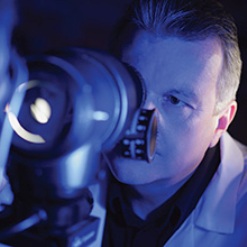 The goal of extending services for optometrists is highlighted in the profession's opening exchange to government on the GOS review.
The goal of extending services for optometrists is highlighted in the profession's opening exchange to government on the GOS review.
Department of Health project manager Dr Dilip Chauhan started the review by issuing a series of questions to optics last month (News, March 31). He invited the profession to suggest how pressure on secondary care services could be eased by the use of primary care, and what the barriers were to increasing the volume and range of eye care services undertaken by high street practices.
Optical professional bodies ABDO, AOP, FODO and the College of Optometrists have responded to Dr Chauhan, stating that extending the range of eye care services available from optical practices would be in the best interests of patients, and, judging from research published in Optician ('GP attitudes to optometric prescribing', February 17 2006), would be welcomed by optometrists and GPs.
In its response, the profession warns that there is a growing exodus of optometrists, particularly younger professionals, who opt for a change in career after a decade or so.
'There is some evidence that careers in optometry are not providing the satisfaction they once did,' the response reads. 'We believe that an enhanced role for optometry would address this.'
Optics is clear on how this can be altered. 'In our opinion the primary barriers to achieving such developments are the organisation and funding of the General Ophthalmic Services,' the response reads. 'Under-funding of the GOS has always been a source of grievance in the optometric profession. The universal feeling amongst optometrists and dispensing opticians is that services are undervalued and under-appreciated.'
The profession openly says sight test fee discussion with government is not 'a meaningful negotiation' and states that even estimates of a £37 eye examination is based on out of date and inadequate data from 1992.
'We would highlight the fact that recent entrants to the Optician magazine awards all spent at least 30 minutes, and on average 45 minutes on an eye examination,' the profession has reported to the DoH. 'The £37 estimate is based on 1992 information that the average length was 25 minutes.'
Current GOS systems are unnecessarily arcane and bureaucratic, the response claims, and the profession calls for properly funded reforms with a view to changes in Scotland and Wales where there has been 'huge enthusiasm' from optometrists to their expanded role.
And, in a week when many NHS dentists have decided to leave the Health Service, the profession stated: 'Rather than walk away from the provision of NHS care, optometrists and dispensing opticians have continued to provide a universal service by cross-subsidising the uneconomic fee payments from the dispensing of spectacles and contact lenses.
This situation is grossly unfair to patients who need spectacles or contact lenses who effectively pay a proportion of their fees and charges to subsidise those who do not - an inversion of the normal principles of the NHS.'
Register now to continue reading
Thank you for visiting Optician Online. Register now to access up to 10 news and opinion articles a month.
Register
Already have an account? Sign in here
